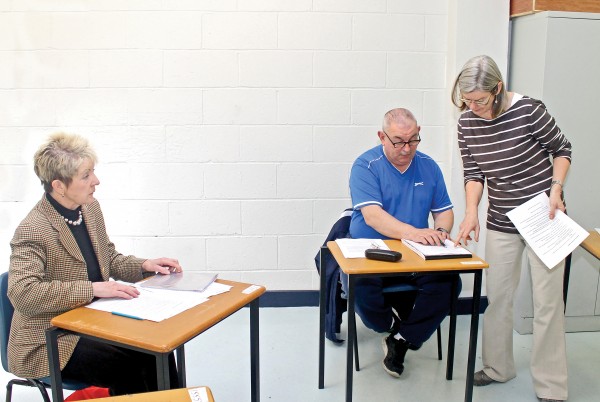
Pictured above, from left: Frances Cornell, Paddy Murphy and Rachel McNicholl.
Ringsend College on Cambridge Road plays host to a variety of evening courses and Adult Education endeavours, as locals are bound to know, and while practical basics might be expected to be first and foremost, those basics can be fertile ground for creative endeavours.
The Adult Education Service provides one-on-one tuition in a variety of subjects, from basic numeracy and literacy skills, to larger classes in computer literacy and maintenance, horticulture, or personal organisational skills.
NewsFour had a chance to sit down with teacher Rachel McNicoll and the members of her Creative Writing group, about the pleasures of the written word and the self-discovery that comes with going back to the basics.
While many of the Adult Education courses are FETAC-certified, McNicoll’s writing program is not, which she says allows for more flexibility. Feedback from the students helps guide the course. The results of this freeing learning situation are a brace of short stories – ‘vignettes’ – written by these creative writers, and inspired by given topics.
Last year, for a pamphlet entitled Simply the Best: Short Stories by the Ringsend Adult Education Creative Writing Group, the stories sprang from paintings and cartoons selected to provide inspiration. This year, the theme was Smell Memories.
The three freshly-minted authors – Mary O’Neill, Francis Parnell and Paddy Murphy – were happy to share their insights and experiences. O’Neill commented on how her feelings about writers had changed. “I realised how difficult it is. To sit, and take a year or two or three and just write and write and write, it’s a real challenge. It’s a very rewarding thing to do though. There’s a writer in everybody, it’s just about finding the time.’
Parnell, for her part, explained that when the opportunity came to pursue creative writing in the course, she thought, Why Not? “I thought I would give it a go.” Her writing features in the first collection, Simply the Best, as well as among the new batch, and she has a particular interest in literary style. “I’ve found that you can read happily about almost anything if the writer is good.” She recommends the celebrated 1958 novel Exodus by Leon Uris as an example of a novel that captured her imagination.
O’Neill assents to this, also passionate about historical fiction. “People don’t change, you might say. There’s a thread connecting us all to historical times.”
Murphy tells us that he gave up on reading for a long time, until Rachel’s course sparked his interest again. “I was on a ship, years ago. I used to be in the Merchant Navy, and I was reading Jaws [the Peter Benchley novel that provided the basis for the famous blockbuster] and I was enjoying it, y’know, but when I got to the end someone had torn out the last six pages. That experience put me off for a long time.”
Writers who have been holding their attention include Maya Angelou, who O’Neill has been reading for a long time, working through the great American poet and author’s collected works.
For Parnell, Walter Macken has been on the bedside table, and she is a fan of Frank O’Conner.
McNicoll explains that they had been looking at writing in the vernacular style. Before the interview, the class were studying Irvine Welsh. If you’ve ever read Trainspotting then you’ll know the book is written in a phonetic style, imitating the sound of the Glaswegian accent in writing.
This kind of formal experiment seems to strike Murphy as interesting. He mentions his sense of amazement on learning that the last chapter of James Joyce’s Ulysses is written entirely without punctuation.
McNicoll jokingly confides that this is the only chapter of that infamous book she has read many times, and she is far from alone in that, as many an avid reader of literature will admit.
McNicoll, for her part, is indeed an avid reader, “Never short of a book to get lost in” as she puts it. She has worked as an editor and translator, as well as an occasional contributor of articles for magazines and journals. At the moment, she is translating a novel by an Austrian author, Anita Augustin, “very dark and very funny”, which she hopes will be picked up by an Irish or British publisher in the future. McNicoll studied languages and literature and has lived abroad for many years, chiefly in Germany. Her enthusiasm for teaching is very apparent.
Keep an eye out for the Ringsend Adult Education Creative Writing Groups output, and if the fancy strikes you, you can find out more by calling or dropping in to Ringsend College or emailing mailto: literacy@aes.cdetb.ie for more information.
By Rúairí Conneely



